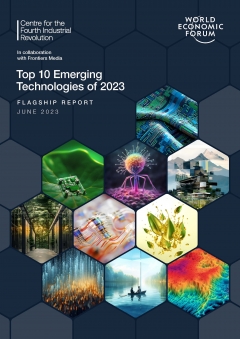International report on emerging technologies highlights ASU's role in supporting direction, development

In 2015, the World Economic Forum named the gene-editing tool CRISPR as one of the top 10 emerging technologies of the year. Five years later, its inventors won a Nobel Prize.
In 2017, the World Energy Council foretold the importance of mRNA vaccines, the technology that delivered COVID-19 vaccines to billions worldwide.
Since 2012, the World Economic Forum's Top 10 Emerging Technologies Report has identified technologies that are poised to positively impact society over the next three to five years. This week, they released the 2023 report, with significant input from Arizona State University Professor Andrew Maynard, also a senior global futures scholar, who explores the benefits and risks of emerging technologies through his work in the School for the Future of Innovation in Society.
The annual report identifies a number of specific technological innovations and concepts that might otherwise be overlooked as part of broader global development, especially to nations and regions in need of such innovation.
“With the development of new technologies comes a responsibility to consider the impacts they will have and could potentially have on society. The role of a university is to facilitate understanding of these complexities and work across disciplines to help navigate the best outcome for our local, national and global communities,” said Sally C. Morton, executive vice president of ASU Knowledge Enterprise.
“To me, ASU has a critical role to play. We can draw on technologists, scientists, engineers, social scientists, artists, philosophers, policy experts — a whole bunch of people — and we don't necessarily have an economic stake in the game. But we do have a social stake in the game, and I think that that's where an institution like ASU can actually pull together our very, very deep expertise and be part of making a difference.”
— Andrew Maynard, ASU senior global futures scholar
“Additionally, transitioning to new technologies requires critical thinkers and strong leaders. ASU is developing the kind of talent needed to address these complex social issues,” she said.
The report includes a number of technological approaches to sustainability and health care, such as flexible batteries, wearable plant sensors, AI-facilitated health care and a metaverse for mental health, all innovations that Maynard says require broad, transdisciplinary approaches that cannot occur under traditional or siloed circumstances.

“The purpose of this report is to raise awareness around potentially transformative technologies that are likely to have a substantial impact on global society over the next five, 10, 20 years,” said Maynard, an expert on advanced technology transitions and the potential risks and benefits of transformative technologies.
“There has long been a tendency to latch on to the biggest, loudest innovations, so this report helps us break away from those very big stovepipes of technology trends to look at the intersections between different technologies that are going to be transformative.”
Maynard is a member of the report’s steering committee and a collaborator on two chapters: “Sustainable Computing” and “AI-facilitated Healthcare.” Maynard notes that the World Economic Forum, which is holding its annual meeting this week in Tianjin, China, is one of a handful of organizations positioned to convene global influencers and stakeholders to shine a light on these emerging technologies and help bring them to where they are needed most.
“There is an important need for independent thought leaders who can bring a breadth of perspective to how you actually navigate these technologies to those in need,” Maynard said. “To me, ASU has a critical role to play. We can draw on technologists, scientists, engineers, social scientists, artists, philosophers, policy experts — a whole bunch of people — and we don't necessarily have an economic stake in the game. But we do have a social stake in the game, and I think that that's where an institution like ASU can actually pull together our very, very deep expertise and be part of making a difference.”
Neal Woodbury, vice president and chief science and technology officer at ASU Knowledge Enterprise, also sees the university as a moderating force in the use of emerging technologies — one that examines their societal implications, both positive and negative.
“Artificial intelligence is a perfect example of one of the technologies where we can play a really big and impactful role,” Woodbury said. “How can we apply this technology in ways that are equitable? How can we develop it in the direction that is of public good, according to our charter? How is it going to benefit our community as a community rather than benefiting the bottom line? The other side of that is studying what AI is actually doing to society. In order to understand the benefit, we first need to understand the impact, so that we can help guide the way that technology will go.”
ASU’s strength in facilitating these conversations is inherent to its structure as an interdisciplinary problem-solving engine.
“There are very few places where the social scientists who are exploring the potential good and bad of a technology really sit down in a regular and integrated way with the technologists who are creating it. It’s become more common, but we've been kind of the vanguard of that approach,” Woodbury said.
By design, ASU has proactively established a robust infrastructure and developed strong community and industry partnerships that support rapid mobilization of emerging innovations.
For example, ASU recently launched six Science and Technology Centers, or STCs, that provide the expertise, facilities and infrastructure to collaborate with industry and develop future-focused technologies and science-based solutions. As part of Arizona’s New Economy Initiative, STCs are helping accelerate discovery, grow and attract new enterprises to the state, build the workforce through training and skill building, and drive entrepreneurship through knowledge translation, technology transfer and support for startups.
Maynard also sees ASU, which was recently granted membership into the prestigious American Association of Universities, as a unique institution that can help develop future innovators and policy leaders who understand the value and importance of emerging technologies and how they may help drive healthier global futures through programs and units like the School for the Future of Innovation in Society and the Consortium for Science, Policy and Outcomes.
“I think this list highlights the fact that you cannot train in one particular area and develop that technology in isolation. You've got to have a broad perspective, a broad set of tools, a broad set of understanding, and that has to span both the technologies and the social sciences. If we're going to navigate the technology transitions these sorts of technologies represent, we've got to have people who can move into leadership positions that understand that breadth of perspective.”
The School for the Future of Innovation in Society, one of four academic units within the College of Global Futures, focuses on responsible innovation that creates a better future for all. Several of the school’s degree programs prepare students to work at the intersection of technology and society, including a bachelor’s degree in innovation in society, an online master’s degree in global technology and development and an online master’s degree in public interest technology.
“The school has degree programs that train our students and future leaders with that depth of perspective. And, of course, this is what we're building in the College of Global Futures,” Maynard said.
The College of Global Futures and School for the Future of Innovation in Society are units of the Julie Ann Wrigley Global Futures Laboratory.
More Science and technology

The Sun Devil who revolutionized kitty litter
If you have a cat, there’s a good chance you’re benefiting from the work of an Arizona State University alumna. In honor of Women's History Month, we're sharing her story.A pioneering chemist…

ASU to host 2 new 51 Pegasi b Fellows, cementing leadership in exoplanet research
Arizona State University continues its rapid rise in planetary astronomy, welcoming two new 51 Pegasi b Fellows to its exoplanet research team in fall 2025. The Heising-Simons Foundation awarded the…

ASU students win big at homeland security design challenge
By Cynthia GerberArizona State University students took home five prizes — including two first-place victories — from this year’s Designing Actionable Solutions for a Secure Homeland student design…

